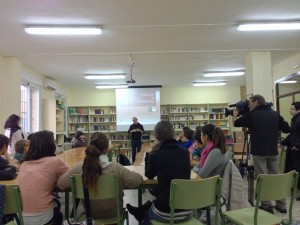When flipping though my notes from our time in Malaga, there are certain events that stand out sharply in my memory as being very moving. On March 19th, a few of us visited the offices of an organization called Movimiento contra la Intolerancia to interview Valentine, one of the main program workers. We had met him the day before at a panel discussion and were excited to go to their offices and learn more about their work.
We met in the morning and walked together through new and unfamiliar streets of Malaga to the address of the center. When we got to the address we didn’t see any indication that this indeed was the office building, so as we started up the several flights of stairs we crossed our fingers that we had gotten it right. Thankfully, Valentine greeted us when we rang the apartment door. He explained that they couldn’t have the offices be recognizable from the streets because they would run the risk of potential hate crimes or assaults to the building or even to themselves. This small fact was an appropriate introduction for us in our understanding of just how serious their line of work is, just how controversial. We set up our flip cameras and began our questioning. He was a soft-spoken man who gave off a no messing around demeanor that seemed fitting with the serious, sometimes life or death work that they do. There are over 4,000 hate crimes in Spain every year, hate crimes against gays, against immigrants, and many more minority groups. People who have suffered hate crimes can approach Movimiento contra la Intolerancia and they will facilitate pro bono cases. We also learned that one of the main aspects of the organization’s work is the education of young students in regards to different kinds of intolerance in an effort to create a more accepting generation. All of this information provided a great basis for us in our full appreciation of the afternoon’s activities with the organization.
After the interview we had the privilege of accompanying one of the workers to a middle school to sit in on their lesson to kids about different types of intolerance. On the bus ride there, she explained to our Spanish speakers of the group that their organization frequently gets asked by schools to come back repeatedly and teach their kids about intolerance. The class that we visited was co-ed with kids from a clear variety of upbringings. They waved excitedly at us and we responded with the same enthusiasm. I felt an immediate connection to the dynamics of the classroom. Was it really so long ago that we ourselves were struggling through middle school? The organization worker started with the explanations of different types of intolerance and their harmful consequences. Homophobia, xenophobia and “racismo” were all concepts fully discussed during this lesson. It was clear that for most of the students these concepts were new information. It was truly captivating, watching these kids ask questions and become engaged in the lesson. To see before our eyes this next generation of Spaniards learn the meanings and consequences of racism, xenophobia, and hate crimes was incredibly moving.
This trip gave us all hope that there would some day be a change in the status and conditions of living for the overall population of immigrants and minority groups within Spain. Watching the kids get excited about the new information in such a positive way was truly inspirational. We were all very appreciative of Movimiento contra la Intolerancia’s willingness to include us in their work. It provided for me a beautiful wrap up and hopeful ending to a trip full exposures to the hardships of these marginalized populations. To know that immigrants might one day be treated with more respect and equality in this country, and to have personally witnessed the beginning stages of this new acceptance, was such an honor.

-Claire Murphy
